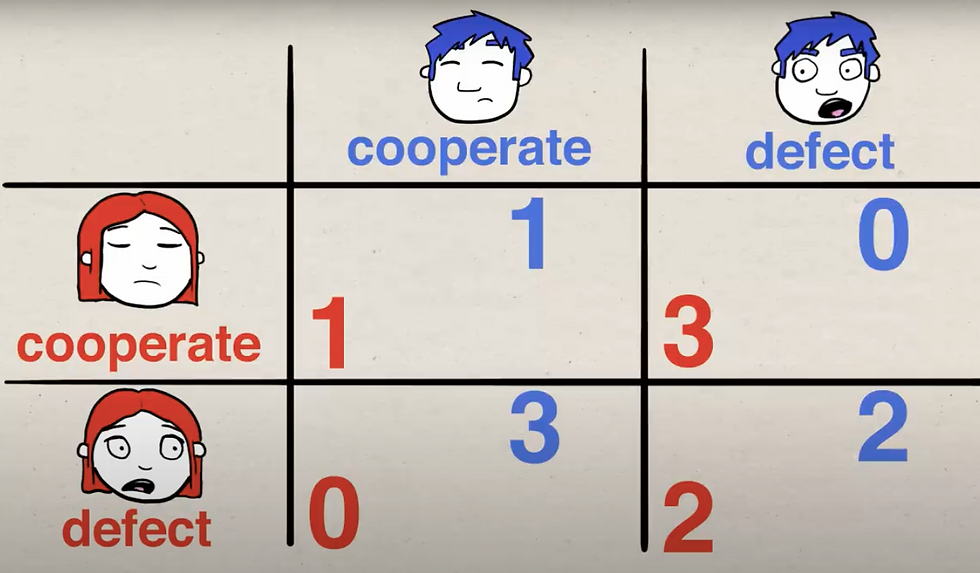Game Theory of Social Distancing: Rational or Irrational?
- SupplyYourDemand

- Jun 18, 2020
- 3 min read
Updated: Jun 19, 2020
2020 has been an unprecedented year. Who would have thought that we’d be living through a global pandemic, one that has uprooted the routines of many and caused chaos and disruption to everyone's lives? The contagious nature of COVID-19 has meant that social distancing has now been enforced by governments all over the world. But what would we choose if the government had not placed fines for not following the rules? Would we still maintain social distancing measures? According to game theory and economists, we would not. So lets see why.
Game theory is the analysis of strategies used by rational decision-makers in an environment where all actions are interdependent.The diagram above shows the classic examples used in game theory called Prisoner’s Dilemma. Here, there are 2 Players: Player A and Player B.

The Prisoner’s Dilemma is a paradox in behavioural economics which shows that when two individuals act in their own self interests, the outcome is not optimum.
Suppose two individuals, Ollie (Player A) and Jemma (Player B) are caught robbing a bank. They are both interrogated separately. The police give them each a choice and force a confession:
‘Admit your partner did the crime, and you will walk free. However, your partner will receive 3 years in jail. If you stay silent, but your partner betrays you, you will spend 3 years in jail whilst they walk free. If you both stay silent, you will each only serve 1 year in jail. If you both betray each other, then you will both spend 2 years in jail.’
Defect = betray
Cooperate = cooperate with your partner and stay silent
Taking Jemma’s perspective, if she thinks Ollie is going to stay silent (cooperate), she will betray (defect) as going free is better than spending one year in jail. If she thinks Ollie will betray her, she will also betray him, so that she only gets 2 years in jail, as opposed to 3. Ollie is in the exact same position.
This highlights that whatever Player B chooses, Player A will defect (betray), as they individually stand to gain more. However, it is shown in the table that both Players will benefit more as a team if they cooperate (adding up the scores in each sub box).
Defect = going out / not social distancing
Cooperate = staying in / social distancing
Police = Government
Following from Prisoner’s Dilemma, we can see that the most rational decision for society is to cooperate, where all parties benefit from social distancing and there will be fewer cases of coronavirus. However, humans are not rational beings and it is in our nature to defect, as we gain more satisfaction from not social distancing and going outside. This is clearly harmful as it promotes the spread of COVID-19. Which raises the question; how do we ensure people cooperate?
The philosopher, Thomas Hobbes came up with a solution in which we must simply force people into cooperation through legislation and rules. This is where the government comes in as a third player, taking us from defecting at 2-2 to cooperating 1-1, through rules, such as enforcing the lockdown in order to ensure we maintained social distancing and stayed at home. Therefore, the government plays a major role as the policeman in the Prisoner’s Dilemma, in enforcing peace and cooperation amongst players (the population).
Overall, the Prisoner's Dilemma shows that the most rational decision is for all Players to cooperate i.e. social distancing rules. However, humans are not rational beings and we are in the real world where we cannot make a ceteris paribus (meaning that everything else is held constant) assumption. The government has played a key role and as a third party; it has managed to create the most efficient outcome of maintaining social distancing through the imposition of distancing regulation. Over the last few months, we have directly been under the 2 meter distancing rule, urged to wear face coverings on public transport, and supermarket queue adaptations. Being enforced through means of fines, and general public fear, the government has ensured the most beneficial outcome for society as a whole.
However, not everyone agrees and many have been inconvenienced by the rules that the government has made. For example, the amount of jobless claims has risen by 856,500 to 2.097 million (1). This has raised many other issues for the UK government like increasing the amount the benefits and loans being lent out, and rising unemployment leads to falling productivity. Unequal enforcement of the rule has led to great backlash, for example, Cummings’ controversial actions. We can further scrutinise the government’s general handling of this pandemic, in comparison to other European countries and economies around the world.
Co-authored by Shaniya Mistry, Priscialla Chau and Sarita Kumari
(1) https://www.cnbc.com/2020/05/19/uk-jobless-claims-rise-by-70percent-in-april-to-2point1-million.html


Comments